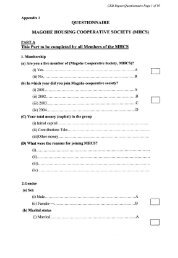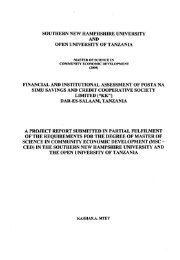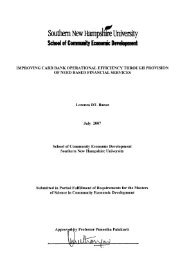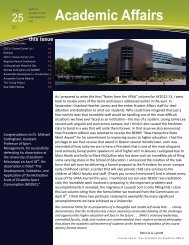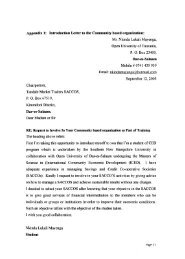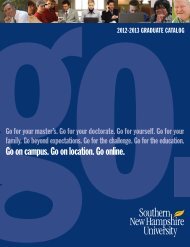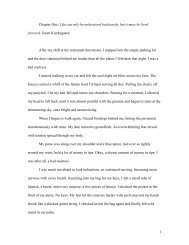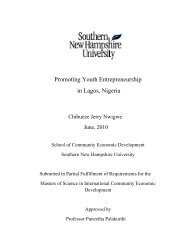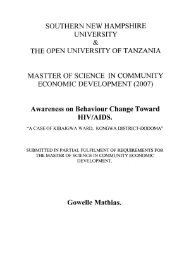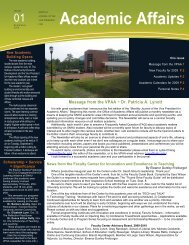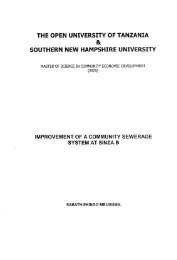3 - SNHU Academic Archive
3 - SNHU Academic Archive
3 - SNHU Academic Archive
You also want an ePaper? Increase the reach of your titles
YUMPU automatically turns print PDFs into web optimized ePapers that Google loves.
91<br />
If your adjusted gross family income is<br />
$25,000 or more and you wish to apply for<br />
federal interest subsidy, you must submit to<br />
the lender a recommendation from your<br />
college, based on an analysis of your need.<br />
In most cases, this recommendation is<br />
prepared by the financial aid officer at your<br />
college.<br />
Students who are not eligible for<br />
federal interest benefits may still apply for<br />
guaranteed student loans; but will have to<br />
pay their own interest over the entire life of<br />
the loan.<br />
An insurance premium of up to one<br />
percent (1 %) each year of the loan may be<br />
collected in advance under a State or private<br />
guarantee agency program. Usually this<br />
premium is collected, for your in-school and<br />
grace periods of time, by the lender at the<br />
time of loan disbursement.<br />
Repayment of such loans normally<br />
begin between 9 and 12 months after you<br />
graduate or leave school, and you may be<br />
allowed to take up to ten years to repay the<br />
loan. The amount of your payments depends<br />
upon the size of your debt and your ability to<br />
pay; but in most cases you must pay at least<br />
$360 per year unless the lender agrees to a<br />
lesser amount. At the time your repayment<br />
schedule is set, the lender will collect a 1 %<br />
insurance premium, per year on the unpaid<br />
balance, based on your schedule of<br />
repayments.<br />
You do not have to make repayments<br />
for up to three years while you serve in the<br />
Armed Forces, Peace Corps, or in full-time<br />
volunteer programs conducted by ACTION.<br />
In addition, deferments are available any<br />
time you return to full-time study and for a<br />
period of not more than one year for<br />
students who are unable to find full-time<br />
employment.<br />
New Hampshire College urges all its<br />
Scholarship and Assistance applicants to<br />
seek aid from the Guaranteed Student Loan<br />
Program operating in their home states.<br />
NEW HAMPSHIRE INCENTIVE<br />
PROGRAM-(NHIP)<br />
The New Hampshire Incentive Program<br />
(NHIP) is designed to provide increased,<br />
equal access and choice for deserving,<br />
needy New Hampshire residents seeking the<br />
benefits of postsecondary education/training<br />
within the State.<br />
NHIP awards provide gift assistance<br />
ranging from $100 to $1500 based on your<br />
need, academic qualifications, the tuition<br />
charges at the institution you select within<br />
the State, and your willingness to help<br />
yourself.<br />
To be eligible incoming freshmen<br />
students must have graduated in the upper<br />
3/5th's of their high school graduating class<br />
or have had a high school grade-pointaverage<br />
of 2.40 on a 4.00 scale. If a non<br />
graduate, you may qualify academically if<br />
you have a G.E.D. Certificate and scored on<br />
the average in the 50th percentile or higher<br />
based on national averages. Upperclassmen<br />
and renewal applicants are judged on the<br />
basis of their postsecondary work.<br />
Demonstrated need is determined on<br />
the basis of your eligibility index which is a<br />
product of your application for a Basic<br />
Grant. You DO NOT NEED to be eligible for a<br />
Basic Grant in order to qualify for a NHIP<br />
Grant; but you must apply for a Basic Grant<br />
The NHIP picks up where the Basic Grant<br />
Program leaves off



